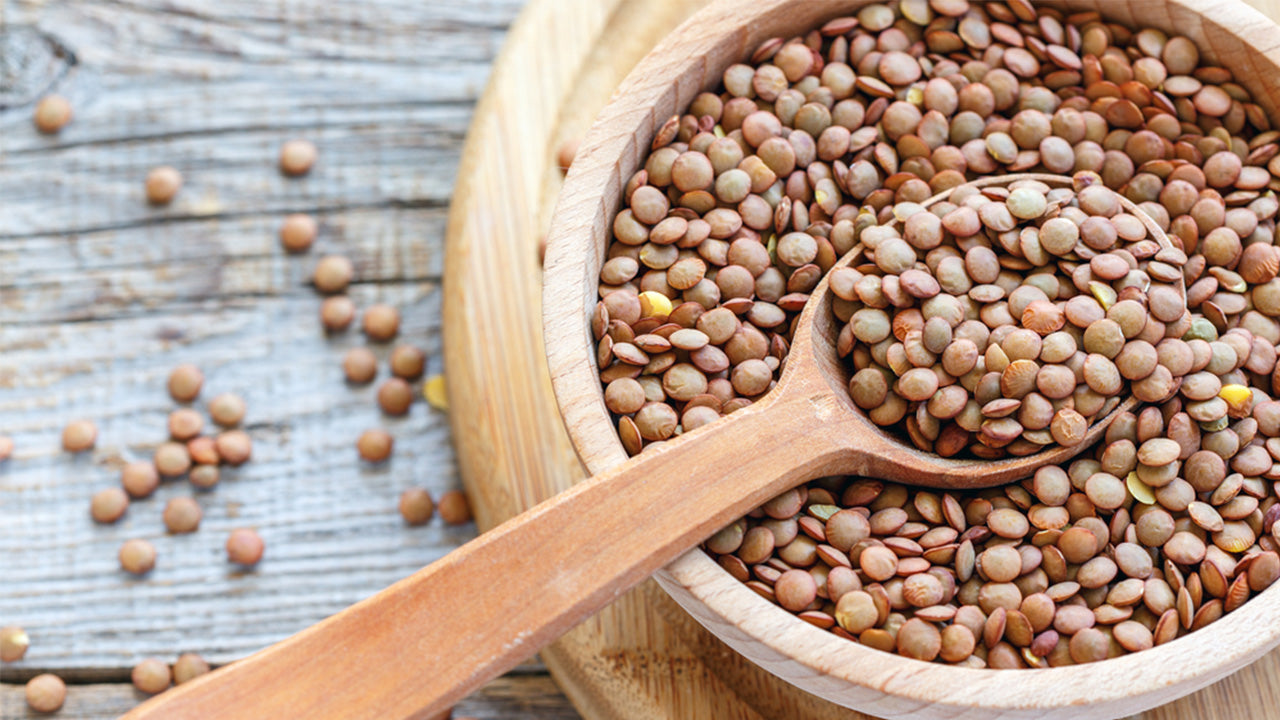Lentil Nutrition: Do Lentils Contain All 9 Essential Amino Acids?
 By: by Amino Science
By: by Amino Science

Lentils are legumes—cousin to foods such as beans, peanuts, and peas. These edible pulses come in many colors and sizes. Green lentils add a peppery punch to salads and red lentils provide a hearty bed for baked salmon or roasted chicken. They’re inexpensive and can be stored for a long time without refrigeration, two benefits that have made lentils a diet staple of many cultures around the world, and a go-to protein source of the vegan diet. But how complete is lentil nutrition, especially when it comes to its protein content? Let’s find out!
Lentil Nutrition
Lentils are an excellent source of protein for meat eaters, vegans, and vegetarians alike. One cup of lentils (about 200 grams) contains approximately 230 calories of carbohydrate and 18 grams of protein. Lentils are also high in iron, folate, and fiber (both soluble and insoluble). Today’s discussion, however, centers on lentils as a plant protein. So let's find out: do lentils contain all nine essential amino acids or are they an incomplete protein source?
Are Lentils a Complete Protein?
Proteins in the body are composed of 20 different amino acids hooked together in a specific sequence and amount. There are two general types of dietary amino acids: those that can be produced in the body (called nonessential amino acids) and those that must be obtained through the diet (the essential amino acids). We’ll be referring to essential amino acids as EAAs.
Now, lentils are indeed a good source of EAAs, but there is debate as to whether lentils are a complete protein. A complete protein contains all nine EAAs.
Take a look at the figure below. It shows the profile of the EAAs in lentils compared to your daily EAA requirements. Notice how the methionine content of lentil protein is quite low relative to EAA requirements. Also, less than 50% of the methionine in lentils is actually absorbed by the body. We can surmise that, although lentil protein is theoretically a complete protein, in practice it is deficient in the essential amino acid methionine.

Health Benefits of Lentils
For a recent epidemiological study, researchers analyzed the diets of more than 3,000 subjects and concluded that older adults at risk for cardiovascular disease who frequently consumed legumes, particularly lentils, as part of a Mediterranean diet may be at lower risk for type 2 diabetes. This effect may be due to the beneficial impact lentils have on digestion. Lentils delay gastric emptying, which is a fancy way of saying that they slow the stomach’s emptying of solids. This could help blunt spikes in blood glucose that ultimately contribute to the development of type 2 diabetes.
Lentils and Digestion
Lentils are not digested readily. Antiproteases in lentils reduce protein digestion.
Proteases are enzymes that are released from the pancreas after you eat food. They play an important role in digestion. Proteases break down ingested protein into amino acids for absorption. The antiproteases in lentils not only reduce the digestion of lentil protein but also reduce the digestion of other proteins in the meal, as well as the secreted proteases. For this reason, care must be taken in analyzing the protein quality of lentils to account for the negative impact of incomplete digestion. Poor protein digestion not only limits the nutritional value of the EAAs in lentils but can also lead to diarrhea.
Protein absorption is also limited by saponins in lentils. In addition to containing chemicals that impair protein digestion, lentils contain phytic acid, which is considered an “anti-nutrient” because it binds to minerals in the digestive system, thereby limiting their absorption.
Cook ‘em Up!
Cooking lentils properly can reduce their adverse digestive impact. Whether you're making Indian Daal or warming up a vegan lentil soup, always rinse lentils before cooking and discard the foam that forms when boiling (the foam is the saponin). Keep in mind that even when you cook lentils correctly they still, to some extent, can impair digestion.
While impaired digestion may be a benefit in terms of minimizing peak levels of blood glucose after a meal, there are some disadvantages. Most prominently, the essential amino acids in lentils are incompletely digested and absorbed. Overall, only about 80% of the amino acids in lentils are absorbed, but the absorption of certain amino acids, including methionine, is as low as 40%. When the low digestibility of methionine is considered in the context of the exceptionally low amount of methionine to begin with, it is reasonable to consider lentils an incomplete protein, which is a protein that has low amounts of just some of the essential amino acids.
Digestion-Corrected Protein Content of Lentils
A cup (200 grams) of lentils has about 6.6 grams of EAAs and 11.4 grams of nonessential amino acids. About 80% of these amino acids are absorbed (less in the case of methionine). This means that about 5.2 grams of EAAs are absorbed from a cup of cooked lentils. While this remains a good source of EAAs, it comes at a caloric cost. Each gram of absorbed EAAs is 44 calories. To put it in perspective, this is about the same kcal/g of EAAs as is in an egg yolk.
The Need for Complementary Protein Consumption
The easiest way to make sure you’re meeting your daily EAA requirements is to eat lentils with animal proteins, such as eggs, meat, dairy products, or fish that have adequate methionine.
If you wish to stick to plant sources of protein, then balancing EAA profiles is more challenging. A variety of whole grains contain methionine, and while grains are deficient in lysine, lentils contain lysine. Therefore, serving lentils with rice or wheat products should, in theory, balance the combined EAA profile. However, grains, including whole grains, are poor sources of protein, and a lot of rice or wheat must be eaten with lentils to make up for the methionine deficiency in lentils. The result is that a high-caloric intake is required to achieve a balanced EAA profile.
EAA Supplements Are an Ideal “Complement” to Lentils
A viable alternative to complementary proteins is to supplement the diet with an appropriately balanced EAA supplement. This will amplify the beneficial effect of the eight essential amino acids in lentil protein and also provide the necessary methionine to make sure you're getting enough protein on all counts. Also, free EAAs in a supplement do not require proteases to be digested, so the antiproteases in lentils will not negatively affect the nutritional value of the EAA supplement.
All Amino Co EAA supplements are non-GMO, vegetarian or vegan, and gluten free. You can check out the entire product line here.
The Verdict
Lentils are a good source of eight of the nine essential amino acids. However, antiproteases in lentils limit the digestibility of lentil protein and other proteins in the meal. Complementing lentil consumption with animal protein or an EAA supplement will enhance the nutritional benefit of the EAAs in lentils.

Up to 25% off Amino
Shop NowTAGS: food
Join the Community
Comments (0)
Most Craveable Recipes




 833-264-6620
833-264-6620



















